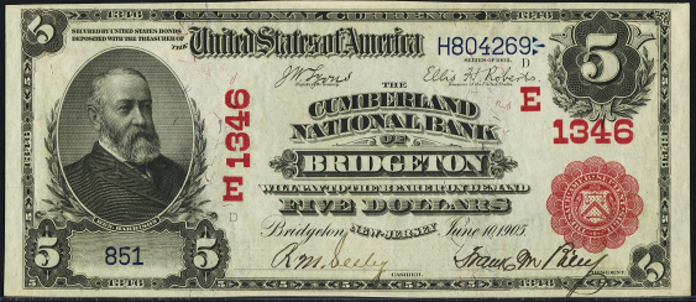Five Dollar Notes › Nationals › 1902 Five Dollar National Bank Notes › Rhode Island Charters › 1902 $5 Hopkinton Rhode Island First National Bank
Get Value Now
| Item | Info |
|---|---|
| Series | 1902 |
| Charter | #1054 First National Bank of Hopkinton, Rhode Island |
| Year Chartered | 1865, 944 Banks Chartered |
| City Info | Hopkinton is a town in Washington County, Rhode Island, United States. The population was 8,188 at the 2010 census. Hopkinton is named after Stephen Hopkins, a signer of the Declaration of Independence who was Governor of the Colony of Rhode Island and Providence Plantations when the town was partitioned from Westerly and incorporated in 1757. Hopkinton once featured a number of industrial villages, such as Locustville, Moscow, Centerville, and Wood River Iron Works, each being named after the mill which they surrounded. Today only Hope Valley, Rockville, Ashaway, and Bradford are recognized with a post office. A section of the town has its own post office known as simply "Hopkinton." The town hall is located in the village of Hopkinton City, which was once a major stagecoach hub.. Source: Wikipedia |
| Similar Cities | If your note doesn't match try: 1. Hopkinton, Massachusetts - Hopkinton National Bank |
| Seal Varieties | Red, Blue |
| See Also | If your note doesn't match try: 1. 1907 $5 Legal Tender 2. 1899 $5 Silver Certificates |
| Other Info | 1. Value depends on notes known for charter, condition and market demand. |
| Neat Fact | Notes from common charters are less valuable compared to rarer charters. Value also depends on type, denomination and total notes known for city, state and region. Ultimate determination of value is collector demand. |
No Obligations Offers and Appraisals
Please submit a good photo or scan. It will be identified and evaluated. Understand there may be subtle differences between the image you see above and your note. Signatures, design, markings and note condition will determine the offer price. Notes in Uncirculated or better condition receive the best offers.
Appraisals can be estimated for wholesale and retail prices. Wholesale is what dealers typically pay. Retail is what a collector might pay. Retail is slightly higher in most cases.
Please visit this page for USA Paper Money Reference. Do not treat this page as a reference guide, it is for appraisal and acquisition purposes only.
